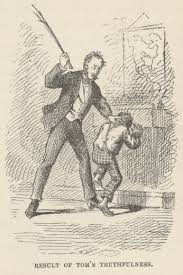ferule
英 ['feru:l]
美 ['ferəl]
- n. 戒尺;管教;纪律
- vt. 用戒尺责打

记忆方法
将“ferule”与“fear”联想,想象一个纪律严明的老师手持一根“ferule”(戒尺),用以警示或惩罚,这样的场景可以帮助你记住这个单词的含义,即“戒尺”或“惩罚的工具”。
以上内容由AI生成, 仅供参考和借鉴
英语词源
- ferule (n.)
- "rod or flat piece of wood for punishing children," 1590s, earlier "giant fennel" (early 15c.), from Middle English ferula "fennel plant" (late 14c.), from Latin ferula "reed, whip, rod, staff; fennel plant or stalk" (fennel stalks were used for administering flogging punishment in ancient Roman times) probably related to festuca "stalk, straw, rod."
权威例句
- 1. No mere ferule will answer for this offence.
- 你犯了这样大的错误,光用戒尺不能解决问题.
- 2. The ferule is used for conversion , tonsure, ordination and parlance.
- 戒尺用于皈依、剃度 、 传戒、说法等场合.
- 3. The teacher often beat him with a ferule when he was young.
- 小时候他没少被老师用戒尺打.
- 4. The teacher strikes the table with his ferule to quiet the students.
- 老师用戒方敲着桌子喊着让同学们安静.
- 5. His rod and his ferule were seldom idle now -- at least among the smaller pupils.
- 他手中的教鞭和戒尺现在很少闲着,至少对那些年龄较小的同学可以这么说.